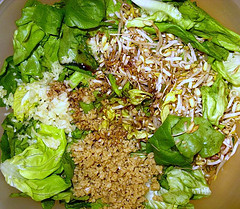
flickr.com/miran
If you’ve ever tried making homemade chocolate fudge, you’ve probably wondered why the cocoa and butter just can’t seem to stay mixed. The answer is certainly in the emulsifying.
Commercial products, like chocolate bars, need an emulsifier to help bond certain ingredients, such as cocoa and butter. Usually, the emulsifier disperses the fat throughout the other ingredients to keep the mixture from separating. Lecithin, in fact, can also act as an emulsifier within the human body. Lecithin is standard ingredient used in many commercial products, from pharmaceuticals to protective coverings, and is often added to vitamin supplements.
What exactly is lecithin?
The human body produces lecithin in the liver, and transports it throughout the circulatory and nervous systems. This phospholipid is also commonly known as phosphatidylcholine, or PC. Lecithin is composed mainly of choline, B vitamins, phosphoric acid, linoleic acid, and inositol.
As a phospholipid (fat-based element), lecithin plays a major role as a building block for cell membranes. The cell membranes, without lecithin, would harden and no longer stay semi-permeable. Lecithin safeguards cells from the destructive effects of oxidation, which is a naturally occurring process in the body caused by the presence of oxygen.
In the food industry, lecithin is regarded as one of the few emulsifiers that are normally regarded as safe, and was approved for human consumption by the United States Food and Drug Administration. Since the substance is already an integral part of biological membranes, it is entirely biodegradable and easily metabolized. Not like its synthetic alternatives, lecithin is virtually non-toxic.
The lecithin used in the commercial food industry is commonly extracted from soy and egg yolk. Other foods containing lecithin are commonly found in many animal and plant based foods including peanuts, liver, wheat germ, cauliflower, grape juice, and cabbage. Various studies have revealed that lecithin from soy may have some positive effects on people with high cholesterol and triglyceride levels in the blood.
The advantages of lecithin seem to be attributed to the presence of choline. As a lipotropic substance, choline performs as an agent in the body’s metabolism that aids in the digestion of fats. Simply put, choline aids to burn the fat that is stored within human tissues, and can act as an agent to support weight loss.
The more choline present in your body, the faster your body will metabolize fat, and the lower your blood cholesterol will be. High blood cholesterol levels contribute to a large number of health ailments, and eventually lead to the congestion of blood vessels. This condition ultimately results in the likely occurrence of stroke and heart attack. However, taking lecithin can help you avoid facing these problems. As lecithin supports fat metabolism and aids in reducing cholesterol levels, it may help to safeguard you against heart attacks and strokes.
Choline, in its dietary supplement form, is normally recommended for treating liver, nerve and a variety of other health conditions. It has also been used to treat degenerative conditions such as multiple sclerosis and memory loss.
As a medication for memory loss or impairment, many nutritionally oriented doctors believe that lecithin or phosphatidylcholine serves as a valuable nerve-building nutrient. Phospholipids serve as a major structural component of brain cells; because of this, lecithin may aid in slowing or even reversing memory loss.
While lecithin plays an essential role in commercial food preparation, there is so much more to this beneficial element. Lecithin is a major ingredient in everything from keeping a stronger heart to building better memory. Make lecithin part of your daily recipe for good health.
Tagged with: soya beans • soybeans
Filed under: Lecithin